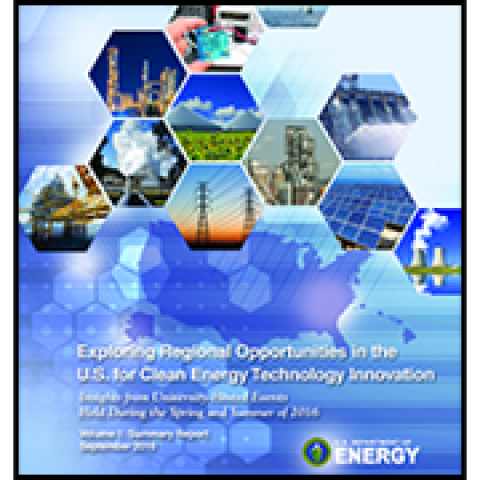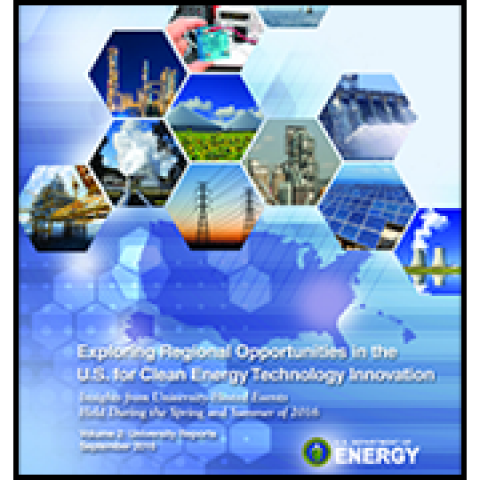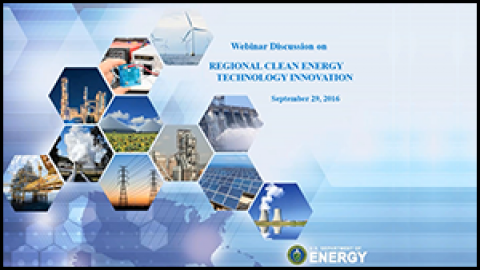The President’s FY2017 Budget Request for Mission Innovation spurred interest in regional clean energy innovation across the nation. From April to September 2016, U.S. research universities invited the U.S. Department of Energy (Department or DOE) to participate in forums to examine the clean energy innovation challenges and opportunities in their regions. These events brought together over 1,700 participants from 37 states and the District of Columbia, including leaders from the U.S. Congress, Governors’ offices, other federal, state, tribal, and local offices, industry and non-profit organizations (NGOs), along with DOE program and staff offices.
Each forum held discussions that covered a broad range of ideas regarding regional energy resources; innovation capacity; and clean energy technology needs, opportunities and challenges. It was widely recognized that innovation is key to our nation’s future low-carbon economy, and the development and expansion of regional clean energy innovation ecosystems will spur economic growth and job creation.
Insights on Regional Opportunities and Challenges
The regional forums provided a venue for participants to discuss current innovation activities and explore opportunities to expand and strengthen collaborations important to innovation ecosystems. All of the events provided insights on the diverse regional opportunities and challenges pertaining to energy resources and innovation capabilities for each of the respective regions.
A key conclusion of the regional events is that clean energy solutions must be tailored to meet regional needs. Forum participants acknowledged regional diversity in energy resources and challenges, priorities, capabilities, customer demands, and markets; this diversity will necessarily focus and shape regional solutions.
Recognizing Shared Opportunities and Challenges
The broad sense of the forum participants was that public-private partnerships involving DOE’s national laboratories, universities, investors, industry, associations and NGOs, and State and local governments can be a powerful tool for driving clean energy technology innovation and advancing economic development.
Challenges shared across regions include: (1) development of a shared vision and strategy, to be addressed through open communication and coordination; (2) scaling up from demonstration to deployment, which calls for sustained engagement of investors and industry partners; (3) regulatory uncertainty, which can be addressed through partnering to ensure that policy evolves in parallel with technology; and (4) other challenges.
Several overarching themes were identified as creating both challenges for regions and opportunities for collaboration and innovation:
- Increasing Interdependence (Convergence) of Energy Sectors: Increasing interdependence of all sectors of the energy system and the coupling of energy to water systems, materials flows, waste products, and energy financial markets.
- Diversification in Energy Production: Challenges and opportunities for energy infrastructure created by the increase of diversification across energy sectors from the expanding role of electricity, hydrogen, natural gas, and biofuels in the transportation sector; the transition of the power sector from coal to natural gas and renewables; and the plans for deployment of small modular reactors.
- Role of Scientific Facilities and Computing to Enable Innovation: The confluence of advances in computing power and software, theory, modeling, synthesis, and characterization is enabling “systems by design” for materials, chemicals, and biological science.
- Energy Efficiency: Addressing the efficient use of resources linked to energy, including water, agricultural products, land, and rare earth materials.
- Energy-Water-Food: Optimizing water utilization and energy use with agricultural irrigation, integrated management of resources, regional decision making, and increased pressure on regional energy systems.
Moving Forward
The regional events served not only as a forum for the exchange of ideas, but also as a catalyst for further action to expand regional innovation ecosystems. By initiating the regional dialogue, these major research universities have highlighted the importance of getting a better understanding of the similarities and differences among regions to inform the shaping of partnerships that could maximize synergies and resulting impacts for clean energy innovation. These forums informed key stakeholders within and among regions, and they highlighted the need for regional cost-shared, public/private partnerships that will develop regional research, development, and demonstration portfolios tailored to the characteristics of the regions that they serve. Many forums closed with a commitment to regularly convene to continue to explore how to understand and improve their energy innovation ecosystems.
Summary Reports on University Events
The Department is pleased to present this two-volume report, “Exploring Regional Opportunities in the U.S. for Clean Energy Technology Innovation”. The report provides a summary of what was learned (Volume I) and an account of the proceedings from the individual university forums (Volume II), with the aim of sharing ideas and lessons learned across regions and among policy makers.
Webinar: Regional Clean Energy Technology Innovation
On September 29, 2016, the U.S. Department of Energy hosted a webinar to hear the results of several university forums that were held from April to September 2016. Please click on the picture below to view a recording of the webinar, and to download the presentation and “Major Takeaways” submitted by the Universities.




